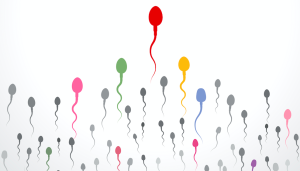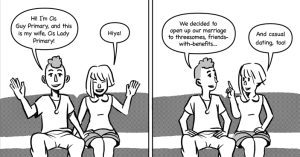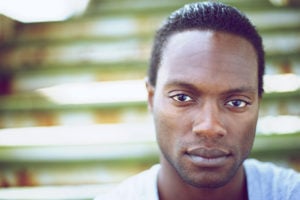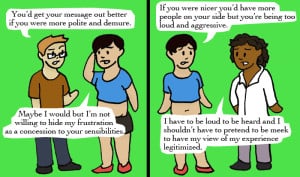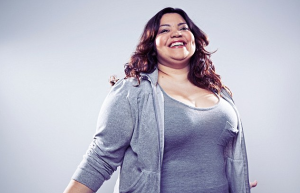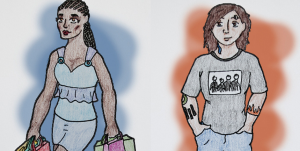Originally published on Autostraddle and republished here with their permission.
In the early days of my transition, it happened sometimes that I would get frustrated with someone messing up my pronouns.
But once in awhile, there would be someone who got it right that made up for any number of people getting it wrong.
One such person was the secretary at the desk at the andrology clinic who explained to an orderly: “She’s here to deposit her sperm.”
To be clear, I have no desire whatsoever for children at the moment. I’m not maternal; I don’t understand how one can get so excited when a baby figures out how to use a spoon. I can do that, and I can do it without making a mess of myself – most of the time.
Nevertheless, being trans means you have to plan ahead. It is possible, somewhere down the line, that I’ll stop seeing babies as small, unemployed, inarticulate noise machines, and when that day comes, I’m kind of tickled by the idea of being one of the very small number of lesbian women whose child can answer the question of which mom is their biological mom with “Both of them!”
With that in mind, I made my appointment, drove out to the university’s medical complex, and checked in at the andrology lab. I sat across the waiting area some distance away from the desk filling out the forms.
An orderly went behind the desk, and perhaps he wasn’t paying much attention to me, because he became very confused when the secretary said, “Can you take Miss Catherwood to Room 1?”
Bear in mind that these little rooms have nothing in them but a sink, a bunch of porno magazines, a TV with a bunch of porno tapes, and a chair which no woman in her right mind would sit in. There is only one thing that these rooms are used for.
So after being asked to take “Miss Catherwood” to one of these rooms, the orderly glanced at me briefly, then asked the secretary, quietly but audibly enough in the nearly silent waiting room, “Why?”
The secretary told him, quite simply, “She’s making a deposit.”
Increasingly bewildered, he asked, “A deposit of what?”
And the girl said in a tone as though this should be completely obvious, “Of her sperm.” Like, duh.
This was about the time I got up and brought the forms back to the desk.
I appreciated the secretary’s attitude, and moreover, it managed to momentarily distract me from the fact that I was actually very nervous about this.
Not about ejaculating in public, I have a history that adequately prepared me for that sort of thing, but because I was worried that I had waited too long to do this.
I had already been on hormones for some time. One thing the doctors warn you of is that, not-unexpectedly, going on a high dose of estrogen as well as a testosterone blocker does not do wonders for your fertility.
I found myself getting the wrong kind of worked up on the way to the room, thinking, “I’ve totally screwed this up, my sperm are probably all floating at the top of the ball, belly up, or swimming in circles in estrogen clouded-waters like goldfish dropped into a murky swamp, wondering what the hell’s going on around here.”
Then it hit me that by getting myself so worked up, I might make it worse by scaring them. Do sperm get test anxiety? I had to calm down. I chatted with the orderly to distract myself.
He told me I had thirty minutes to produce the sample, and I responded, “Thirty minutes? That doesn’t leave a lot of time for foreplay. No time whatsoever for cuddling afterward.” He didn’t seem to appreciate the joke.
Not willing to give up so easily, I asked, “Well if I’m going to be cutting corners anyway, what is the fastest anyone has ever been in and out of here?” and he responded, “I don’t know. A couple minutes.” I nodded: “Two minutes. Challenge accepted.”
Not so much as a grin.
Inside, I lifted my skirt and got to work. I didn’t manage to beat two minutes, by which I mean I beat for more than two minutes, after which I had a little form to fill out that asked some basic questions such as how long it had been since my last ejaculation and that sort of thing.
It asked if any semen was lost (dribbled out) during collection. On the blank I wrote, “Nope!” and signed “Annie Oakley.”
Like a girl bringing home her first A+, I proudly marched my little cup to the lab where I was to give it to the doctor who would analyze it. Along the way, I explored a little, very curious to see what the freezer section of this combination doctors office and pornography supercenter looked like. I didn’t find it.
Arriving at the doctor’s office, I gave him my sample, and he told me to wait while he pulled up my file to make sure he had my information. While he was doing so, it occurred to me, “He’s a sperm doctor; this guy has got to have a good sense of humor.” Hoping he would make up for the humorless orderly, I asked him, “So, what makes a guy go into the sperm trade?”
His response was disappointing. He just said, “Oh, I don’t know, the job was open at the right time, I was qualified to….” blah blah blah.
I don’t know why, but I really thought the sperm guy would have something more witty to say. I expected, “I heard that it was an up and coming business!” or something to that effect. I suppose I can’t complain about a medical appointment that includes an orgasm.
The doctor called that afternoon with my analysis while I was in the supermarket, the freezer section to be precise. Already, I’d been expecting tragic news about the state of things down under, and I thought a tub of ice cream might make me feel better (don’t think about that one too hard).
I checked the caller before answering and thought to myself, “Damn, that was really fast. Didn’t take long to count ‘em, not a good sign…”
I stood gazing at the container of frozen ice cream I had just pulled out as I listened to him begin to explain how the whole thing worked. I knew what he would say.
I knew I shouldn’t have waited so long after going on estrogen and spironolactone, and the tub of Karamel Sutra melting in my hand wasn’t going to bring me much comfort. He was about to break the news that I would never have a child of my own, and nothing else had ever made it so clear that I wanted one.
I really, really wanted one.
He laid it all out for me.
The average man’s sperm count is twenty million. The average woman’s sperm count is zero, and I had 28 million more sperm than the average woman.
He also told me that average sperm motility is 60%, while mine was about 70%. That means rather than swimming in circles or floating aimlessly, my sperm apparently shoot around like armor piercing missiles.
Naturally, to all of this I responded, “Yes!” and did a happy little dance in the freezer section of Jewel-Osco which attracted no small degree of attention.
When I was finished celebrating, I thanked the doctor and hung up. I placed the ice cream gently back in the freezer and shut the door.
I was in a fine mood for the remainder of the day, but those few hours spent wondering, and those few moments spent convinced that I had thoughtlessly traded away my ability to have a child, stuck with me.
I would not have traded it for nothing, of course; I would have traded it for a body I am finally comfortable in and a life worth living. And yet, some part of me thought, “Yeah… but still…”
It dawned upon me that this question of the ability to have children is not a frequent one in our discourse.
Perhaps because, as part of the LGBTQIA+ community (not to open a can of worms), we are among a group of people who already face a certain reproductive challenge that most heterosexual couples do not. Or perhaps it is because, unlike lesbians and gays, previous generations of transpeople have not necessarily shared this problem.
Thanks largely to a more accepting social climate, over the last thirty years, the average age of transition for a transperson has plummeted. Now we see teenagers and young children transitioning, and like anyone else, I’m filled with joy for them, and perhaps a touch of envy.
Riki Wilchins recently wrote a somewhat controversial op-ed discussing the fact that due to the gradually lowering age of transition and the slowly shifting culture, the experiences of the new generation of trans people would bear little resemblance to the experiences of the generations that have come before.
And in most respects, I think we can agree, good for them! No decades of crushing inner turmoil trying to live a lie. No having to explain to a spouse of twenty years that you’re not who they think you are. And in the cases of transitioning in childhood, maybe even no struggling with the physical aftermath of the wrong kind of puberty. Good for those kids. Jerks.
But among those experiences this new generation of early transitioners will not share will be that of fathering or mothering a biological child, and while we may argue about the degree of significance, it is a thing that is lost in transition.
I know many older transgender people who were married and had children prior to their transition; I also know many younger transgender people who, having transitioned early, will not have those experiences — in most respects, a very positive development. And yet, some part of me thinks, “Yeah… but still…”
To be entirely clear, here is a brief list of things I am not suggesting:
- That the benefits of transitioning do not outweigh the losses. This is not an argument against transitioning at any age.
- That everyone must want a biological child, or even want children at all. Certainly, many people do not.
- That one could not love an adopted child or a child born with the assistance of a third party every bit as powerfully as a child that is their biological offspring. Of course they can.
All I am suggesting is an addendum to something already commonly understood.
The decision to transition is a major one, one with many consequences, most of them positive, and it is a decision which must be informed.
All I suggest is that considering the matter of fertility should be part of that informed decision.
Because it is an important one, and it is one we might not think about until it is too late.
[do_widget id=’text-101′]
Rhiannon Catherwood is a PhD candidate at Northern Illinois University where she teaches English and Gender and Sexuality Studies. Her fiction, creative nonfiction, and critical work has appeared in Genre: Forms of Discourse and Culture, Towers Literary and Creative Arts Magazine, Autostraddle, The Huffington Post, 34thParallel, and Plenitude. She believes in life writing as a way to understand ourselves and the world around us. You can find her on her website here.
Search our 3000+ articles!
Read our articles about:
Our online racial justice training
Used by hundreds of universities, non-profits, and businesses.
Click to learn more


